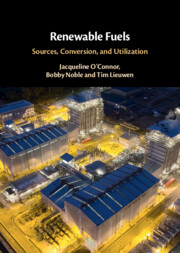Book contents
- Frontmatter
- Contents
- Contributors
- Preface
- Part I Users and Conversion Devices
- 1 Aero Gas Turbines
- 2 Ground-Based Gas Turbines
- 3 Reciprocating Engines
- 4 Process Heaters
- 5 Fuel Cells and Hydrogen Production
- Part II Chemical Energy Carriers
- 6 Syngas and Biogas
- 7 Liquid Fuel Synthesis
- 8 Ammonia
- 9 Metal Fuels
- 10 Bio-based Solid Fuels
- Part III Fundamental Combustion Processes
- 11 Fundamentals of Gaseous Combustion
- 12 Liquid Fuel Atomization and Combustion
- 13 Pollutant Emissions of Alternative Fuels
- Part IV Case Studies
- 14 Certification of Drop-In Alternative Fuels for Aviation
- 15 Fuel Composition Influences on Reciprocating Engine Performance
- 16 Near-Zero- and Zero-Carbon Fuels in Industrial Gas Turbines
- 17 Hydrogen Solutions for Net-Zero Power Generation
- Index
- References
14 - Certification of Drop-In Alternative Fuels for Aviation
Published online by Cambridge University Press: 01 December 2022
- Frontmatter
- Contents
- Contributors
- Preface
- Part I Users and Conversion Devices
- 1 Aero Gas Turbines
- 2 Ground-Based Gas Turbines
- 3 Reciprocating Engines
- 4 Process Heaters
- 5 Fuel Cells and Hydrogen Production
- Part II Chemical Energy Carriers
- 6 Syngas and Biogas
- 7 Liquid Fuel Synthesis
- 8 Ammonia
- 9 Metal Fuels
- 10 Bio-based Solid Fuels
- Part III Fundamental Combustion Processes
- 11 Fundamentals of Gaseous Combustion
- 12 Liquid Fuel Atomization and Combustion
- 13 Pollutant Emissions of Alternative Fuels
- Part IV Case Studies
- 14 Certification of Drop-In Alternative Fuels for Aviation
- 15 Fuel Composition Influences on Reciprocating Engine Performance
- 16 Near-Zero- and Zero-Carbon Fuels in Industrial Gas Turbines
- 17 Hydrogen Solutions for Net-Zero Power Generation
- Index
- References
Summary
A confluence of environmental and supply security are driving the aviation community to consider alternatives to petroleum-derived jet fuels. It was recognized early on in the process that the sheer size of the existing aircraft fleet and supporting jet fuel infrastructure, along with regulatory constraints, precluded the introduction of a chemical energy carrier requiring aircraft or fuel handling equipment modifications. Consequently, the chosen path forward was focused on synthetic alternatives with essentially identical chemical compositions and physical properties, called drop-in fuels. This chapter will describe the regulatory basis enabling the use of these fuels by the existing aircraft fleet and the technical approach used to validate the drop-in nature of these fuels.
Keywords
- Type
- Chapter
- Information
- Renewable FuelsSources, Conversion, and Utilization, pp. 487 - 500Publisher: Cambridge University PressPrint publication year: 2022

